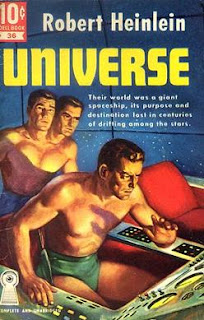My favorite Robert Heinlein science fiction novels, in order.
#10: Starman Jones (1953). The Starman falls for a girl.
#9: Stranger in a Strange Land (1961): A boy raised by Martians founds a hippie cult.
#8: Citizen of the Galaxy (1956): A rich kid is sold into slavery.
#7: Time for the Stars (1956): Hetero-romance spoils the ending of a deep-space adventure.
#6: Have Space Suit-Will Travel (1958): It's spoiled by Heinlein's belief that 1950s fads would last forever.
#5: Starship Troopers (1959). Rico trains to be a soldier. The 1997 movie version gives him (played by Casper Van Dien) a girlfriend.
#4: Red Planet (1949): The boys get lost on Mars, and have to depend on each other to survive.
#3: Tunnel in the Sky (1955): No buddy-bonding among the deep-space castaways, but no romance either.
#2. Space Cadet (1948): The romance between Matt and Tex was a defining moment of my childhood.
And #1: Universe (1941), first published in Astounding, and expanded (and heterosexualized) in Orphans of the Sky (1963).
The muscular, half-naked Hugh grows up in a small farming community, rarely venturing more than two or three decks from home, not worried about much besides crops and friends and mutie attacks. He believes his parents and the Scientists when they tell him that the universe consists of the Ship, a cylindrical cavern. The stars and planets in old books are merely fairy-tales; when the ancients spoke of the journey to "Far Centaurus." they were being metaphorical, talking about the soul's journey to enlightenment.
Then Hugh is captured by a two-headed, muscular, half-naked mutant named Joe-Jim, who convinces him that stars and planets are real, that the Ship is actually traveling through space. Civilization ended after a mutiny generations ago, and everyone forgot their true destiny.
Hugh and Joe-Jim revolt against the Ship's oppressive theocratic government, tell everyone the truth, and try to push forward to their original destination.
Why it's #1:
Gay kids in the 1960s and 1970s struggled with the realization that the adults were wrong, or lying, when they claimed that we all lived in a small heteronormative box, and that there was no escape possible, because there was nothing outside. When they insisted that the same-sex romances that we saw on tv or read about in comics were chimeras, misinterpreted friendships, or at best metaphors for the true, mature, heterosexual loves of adulthood.
But, as Frankie Valli sang,
The adults are lying -- only real is real.



It's one of my favorite books from when I was a teenager. I don't remember where I got it from, it was a used copy but I've read it twenty times probably. Thanks for writing about it!
ReplyDeleteThe time you grew up was arguably the most heteronormative time in history. Censored were the skinny dips and circle jerks of old, to say nothing of fully recognized male couples. Imagine if we celebrated Golan Cipel with statues, maybe even a cult, like Antinous. Instead it was a secret that destroyed Jim McGreevey's career.
ReplyDeleteI grew up long before Golan Cipel made the news, but heteronormativity is still common. Few people today can claim that they are not aware of the existence of LGBT people at all, like they could in the 1970s, but that recognition takes intellectual effort. So professors ask their classes "Guys, ask your girlfriends," and this or that actress is depicted as "Every man's fantasy." They only really acknowledge the existence of gay people when someone else points it out to them.
DeleteFirst gay political scandal I could think of. Well, third, but the first two (Mark Foley and a big Democratic contributor here in California who hires young black male prostitutes and then they OD from drugs he insists they take) felt too "classic gay villain".
Delete